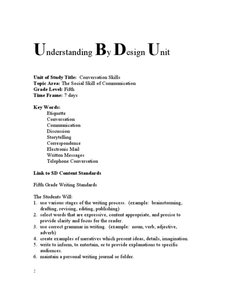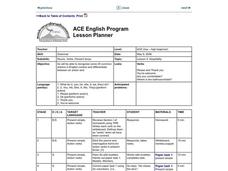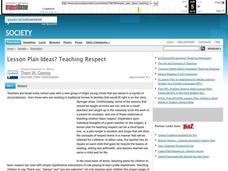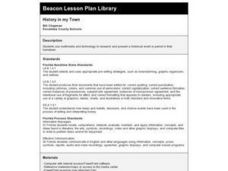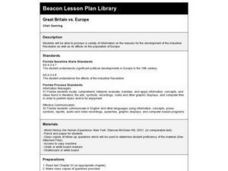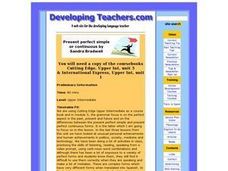Curated OER
Diversity - Grade 9
Ninth graders consider the diversity of the First Nations cultures in Canada. In this cultural diversity activity, 9th graders research the cultural groups of the First Nations and share their findings with their classmates.
Curated OER
Treaties - Grade 10
Tenth graders examine the First Nations Treaty. In this Canadian history lesson, 10th graders participate in talking circles that require them to analyze "The Royal Proclamation."
Curated OER
Suffixes
For this suffixes worksheet, learners choose which word cannot use the suffix asked. Students complete 9 multiple choice questions total.
Curated OER
The Social Skill of Communication
Fifth graders explore communication by analyzing manners. In this social skills lesson plan, 5th graders review the different forms of communication and how to present yourself in a phone conversation, face to face meeting, e-mail, etc....
Curated OER
NFE General Knowledge Quiz
Ninth graders examine various aspects of history. In this MultiGenre lesson, 9th graders participate in a bingo game. Students complete a worksheet on the bingo game afterwards.
Curated OER
Writing Compound Sentences
In this compound sentence worksheet, students write 10 compound sentences using an independent clause provided. Students underline subjects and verbs in both clauses.
Curated OER
Hospitality
Students practice the use of nouns, verbs, and present tense verbs used in conversations about hospitality. In this hospitality and grammar lesson, students complete worksheets using present simple tense verbs. They work with verb...
Curated OER
Teaching Respect
Students discuss what it means to respect others and have a continual discussion throughout the year. In this respect lesson plan, students role play respecting each other.
Curated OER
Dictatorship
Fifth graders research world history by researching democracy. In this dictatorship lesson, 5th graders read the story "The Composition" and identify a list of former dictators on the Internet. Students define several key terms and...
Curated OER
You Mean I Am Part of History?
Fourth graders open the lines of communication between family members and to gain a historical understanding about family history. They research and interview their grandparents and parents and create a research paper.
Curated OER
Government
Eighth graders analyze the purposes of government. They examine or assess the importance of citizenship to the individual or to society at large (e.g., the importance of voting). Students explain the structure and functions of the three...
Curated OER
Conversations
Eighth graders explore the art of conversation. In this giving instructions lesson, 8th graders discuss and respond to rules, play a game, and practice giving instructions to one another. Students are preparing for communicating in English.
Curated OER
History in my Town
Fourth graders research a historical period in their hometown and use PowerPoint to present it to the class.
Curated OER
Great Britain vs. Europe
Fourth graders explore the reasons for the Industrial Revolution and its effects on France.
Curated OER
Will and Would
In this modal auxiliary verbs worksheet, students read about how to use the verbs "will" and "would". Students make 2 sentences for each modal auxiliary verb.
Curated OER
Doctor's Dilemma: Advocacy for Whom?
Students investigate why doctors feel torn between patients and insurance companies. They examine the health care system and how it affects patients. They discuss one's ability to afford health insurance as well.
Curated OER
Science: Why Animals Hibernate
Second graders investigate the reasons animals hibernate. They measure their own heart rates and compare them to those of a hibernating bear. In their journals, 2nd graders record facts about and characteristics of hibernation and...
Curated OER
Household Names
Students explore the accomplishments of famous New Yorkers in the 19th century. In small groups, students read biographies and match them with a corresponding primary source document. The group that is most accurate in matching the...
Curated OER
The Great British History Quiz!
In this social studies worksheet, learners test their knowledge of British history by completing 10 multiple choice questions.
Curated OER
A Guide for Community Living
Students use photography to help them become more knowledgeable about their communities, and to make a "community survival" book in which problems are solved by going to the right community agency.
Curated OER
Presidents of the United States
Students gather data using the Internet to create products related to technology.
Curated OER
It's A Free Country, Isn't It?
Students examine immigration into the United States. They identify the rights and responsbilities of being a citizen of this country. They create a new verse to be included in the National Anthem.
Curated OER
Present Perfect Simple or Continuous
Students discuss and analyze the differences between the present perfect simple and present perfect continuous forms from a clear context and develop the skill of noticing word stress, weak forms of auxiliaries.
Curated OER
Scapegoating
Middle schoolers examine how stereotypes, prejudices and discriminatory practices lead to individuals and groups being blamed for events. They are introduced to the internment of Japanese Americans during World War II.





